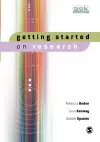
Getting Started on Research
3 authors - Paperback
£48.99
The Editors
The editorial team consists of inter-disciplinary scholars drawn from a range of base disciplines and geographical locations.
Rebecca Boden is professor of critical management at the University of Wales Institute, Cardiff, UK. Her primary focus is the management and financing of sites of knowledge creation, particularly science laboratories and universities. She has published extensively on the issues of how public management policies and practice impact upon knowledge creation and dissemination.
Rosemary Deem is Professor of Education, Graduate Dean & Joint Education Director for the Faculty of Social Sciences and Law at Bristol University. She has done extensive research on the governance and management of higher education.
Debbie Epstein is a professor at Cardiff School of Social Sciences though of South African origin. She is interested in the construction and maintenance of social inequalities and social identities. Her work on higher education and research concerns questions arising from globalisation, governance and research ethics.
Fazal Rizvi is professor of educational policy studies at the University of Illinois, Urbana-Champaign. His research interests include: comparative and international education; higher education and policy in the Asia-Pacific; cultural globalization and education policy; postcolonial theories of identity, representation and education; global inequalities and educational policy; and international student mobility.
Susan Wright is professor of educational anthropology at the Danish University of Education. She has published widely on the globalisation and reform of higher education. She is editor of Learning and Teaching in the Social Sciences.
Rebecca Boden, Rosemary Deem and Debbie Epstein are co-organisers, with Phil Brown of Cardiff University, of a 2006-7 seminar series funded by the Economic and Social Research Council on ‘Geographies of Knowledge/ Geometries of Power: Globalisation and Higher Education in the 21st Century’ which forms the basis for this Yearbook.